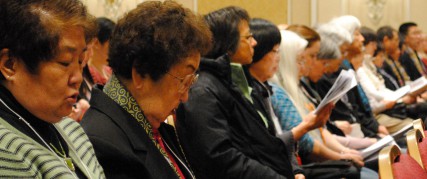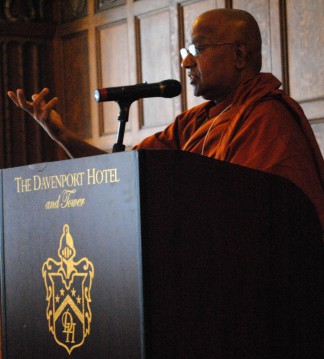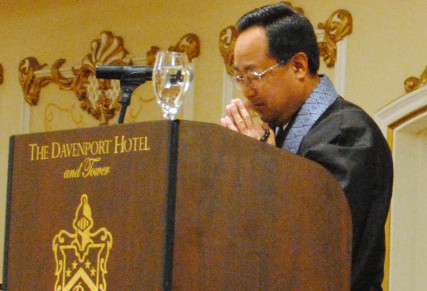By Tracy Simmons favs.news

Buddhist teachings are practical, useable and helpful. At least, they can be if adherents strive to strengthen their minds, Ven. Bhante Seelawimala said Saturday morning at the opening service of the 65th annual Northwest Buddhist Convention. He was one of 300 Buddhists who gathered in downtown Spokane for the conference, which continues through the weekend and is being hosted by the Spokane Buddhist Temple. Buddhists, mostly Shin, traveled from Idaho, Oregon, California, Washington and parts of Canada to attend the conference. [youtube http://www.youtube.com/watch?v=TzrOdEAmENg] In Seelawimala's talk, “Experience the Dharma,” he explained how the Buddha journeyed to enlightenment and what he learned along the way. Seelawimala is a Theravada Buddhist monk from Sri Lanka who teaches at the Institute of Buddhist Studies at Berkley.

“The Buddha found that almost every person does not use the mind to its fullest capacity,” Seelawimala said. “The mind is very powerful…but we don't know how to use it and because of that we experience all kinds of problems in life…it's a corrupted system, and it's corrupted by our own behavior.” Self-centeredness, he said, is the root problem of the corrupted mind. He said the key to having a perfect mind and joyful life is simple. “All you need to do is keep the Buddha in mind and you will become calm, peaceful and more focused,” he said. The Buddha that one needs to focus on, he clarified, is not the person, but instead are the qualities of wisdom and compassion. Seelawimala spoke during the public portion of the event. Many non-Buddhists were in the crowd and he urged them to test his advice. “Buddhism is the only religion in the whole world that says if you don't believe me, go see for yourself,” he jested.

Rev. Marvin Kenju Harada of the Orange County Buddhism Church, spoke after Seelawimala, delivering a keynote address on the essence of Buddhism. Learning to control our egos, he said, is how one can live a peaceful life. He said marriages, families and societies struggles when egos clash. “The ego-self is causing all the problems in life,” he said. “I think Buddhism offers the ultimate solution to all life's problems, it gets to the core of the ego-self…and teaches us how to be liberated from the problems caused by the ego-self.” The theme of the conference is “Under Amida's Umbrella of Compassion.” Amida is the Buddha of light. Numerous workshops were available to attendees Saturday afternoon, as well as a banquet dinner. The convention will conclude Sunday with a dharma message by Harada. “When you're bringing 200 to 300 Buddhist together from across the Northwest district, it's always a wonderful experience,” said Jefferson Workman, a minister's assistant at the Spokane temple. “We're proud people came out for this.” The temple will be offering an introductory course on Buddhism in March. For information visit the temple online. [youtube http://www.youtube.com/watch?v=xpoHClK7u7E] View more photos of this event on our Flickr album.








Anyone who claims to speak for all Buddhists is in hot water. I think simetomes the way people say things, write things makes it sound like they are speaking for everyone. And other times, people do think that there is “a Buddhism” with one way of approaching things. I’m not sure what Alan Senauke’s intentions are behind the particular statement you cited, but it’s probably true that people doing public social action need to be careful about how they speak about Buddhism. I still think the banner argument is kind of weak. If a group of Buddhists from sangha X are doing something together, I don’t think it’s a problem to say they are from sangha X. In fact, my own experiences have shown me how important it is, simetomes, to publicly state you are part of an organization. Just being a loose group of people together simetomes isn’t seen as legitimate. Whereas, the same group of people, saying they are from organization X, will be given more cred simply because they are from that organization. This is the sticky thing about labels. If you get too attached to them, you become self-righteous and protective. But if you try and toss them out all together, then others have no idea who you are. Working with groups is much different from individuals. As an individual, I can approach a stranger and have a nice conversation. I can listen, offer my views, etc. If I’m not coming off as a major threat, there’s an opportunity for connection. However, a group of anonymous strangers is much more likely to be viewed as a potential threat, unless they identify themselves in some manner. Kyle had fun making fun of the folks from the ID Project who sat meditation during the 9/11 protests, but I’d argue that the very simple “ID” they gave offered people the insight they needed to understand why they might be sitting there.nathan recently posted..VA:F [1.9.11_1134]please wait…VA:F [1.9.11_1134](from 0 votes)